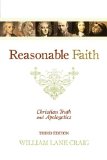I first heard of David Bentley Hart’s new book, Atheist Delusions: The Christian Revolution and its Fashionable Enemies, on volume 98 of the Mars Hill Audio Journal. Thanks to some leftover birthday money, it was soon at my doorstep. I will give the book an “official” review at a later date. In this post, I wanted to look at a larger issue catalyzed by the first paragraph in Atheist Delusions, which I will quote at length. Hart opens by setting the context for his book, which seeks to uncover the folly of today’s popular atheists (pp.3-4):
Conditions in the world of print have never before been so propitious for sanctimonious tirades against religion, or (more narrowly) monotheism, or (more specifically) Christianity, or (more precisely) Roman Catholicism…The God Delusion, an energetic attack on all religious belief, has just been released by Richard Dawkins, the zoologist and tireless tractarian, who – despite his embarrassing incapacity for philosophical reasoning – never fails to entrance his eager readers with his rhetorical recklessness. The journalist Christopher Hitchens, whose talent for intellectual caricature somewhat exceeds his mastery of consecutive logic, has just issued God Is Not Great, a book that raises the wild non sequitur almost to the level of a dialectical method…Sam Harris’s extravagantly callow attack on all religious belief, The End of Faith, has enjoyed robust sales…Philip Pullman’s evangelically atheist (and rather overrated) fantasy trilogy for children, His Dark Materials, has been lavishly praised by numerous critics…its third volume…has even won the (formerly) respectable Whitbread Prize. And one hardly need mention the extraordinary sales achieved by Dan Brown’s Da Vinci Code [sic]…surely the most lucrative novel ever written by a borderline illiterate. I could go on.
My initial reaction to Hart’s asperity (his word), was gleeful laughter. The quote above is more or less indicative of the tone throughout the book: Hart plays the role of the mature, erudite professor scolding a bunch of juvenile high school students (Dawkins, et al) for their facile, jejune publications. I’ve found similar joy in reading other authors who embarrass their opponents with such delightful eloquence.
I question, however, whether or not I am right to “delight” in such things. Though I can’t say for sure, I’ll wager my delight in Hart’s deconstruction of Hitchens is mirrored by atheists who delight in Hitchens’ anti-Christian vitriol. Everybody loves to root for their own side, and when your team scores a touchdown (real or perceived), it’s hard not to cheer.
But therein lies the rub. These people (outspoken atheists in this case) are not my enemies. Nor do I think the “us versus them” mentality is an especially Christ-like posture, let alone one conducive to helpful, civil dialogue. “Our struggle is not against flesh and blood,” after all (Eph.6:12), and where is it written that we are to rejoice when another human being receives their comeuppance? Does God take pleasure in the punishment of the wicked (see Ezk. 18:32, Mt. 23:37, among others)? Should we?
For example, in the many harsh expositions of the New Testament (such as Mt. 23, 2 Tim. 3:1-9, Jude 8-16) I don’t find any indication that fist-pumping glee is the proper reaction. Why, then, is it often my own? When Dan Brown’s historiography is exposed for what it is (i.e., excrement), why do I get a warm feeling inside my chest? To wit: my last sentence brought about a wry smile to my face.
Simply put, I am offended by attacks against my God, and I long to see His Truth vindicated. When another person wages warfare against the beliefs – indeed, the Person! – I hold in highest esteem, it is injurious in two ways. First, I feel it as a personal attack, not unlike somebody decrying my own father or wife. Second, I understand the attack as a lie, and wish the truth to be known over and against it. I don’t find anything sinful in these reactions, per se. They are often cast under the umbrella or “righteous indignation” or “righteous anger,” against which I have no beef. It is rather the attitude behind my reaction that I believe to be sinful: I am hurt, so I wish to hurt back, even if vicariously through another author. Speaking, writing or appreciating a harsh rebuke is no sin, but the attitude behind it can be.
I believe the key to reacting well is to maintain the distinction between the attacker and the attack. The attack (the anti-Christian proposition), is of the devil. It is a lie to be hated and defeated. We love the Truth, and rejoice when the Truth is shown to triumph over the lie. The attacker (the person), is loved by God, and therefore loved by us. Our attitude towards him or her is primarily loving. To see one loved by God so viciously attack Him is ultimately a sorrowful affair. If fatherhood has taught me anything, it is that it is possible to be angry with somebody while simultaneously loving them and laboring for their best. I’ve never once rejoiced at my thorough, truthful rebuke of my own son. Rather, my heart is always heavy. We must walk carefully, however, lest our attitude becomes, “Poor things, they’re so deceived.” We could just as well commit the error of the Pharisee in Lk. 18:11 and thank God we’re not one of those people.
It is often the case that the attack and attacker become blurred in my mind. I confuse the person with the proposition, and make the mistake of thinking that a given philosophical stance exhaustively defines who somebody is. The sayings are perhaps trite, but loving the sinner and hating the sin goes a long way to reacting well, so also does speaking the truth in love. Honestly, I think I fail at this more often than I succeed, as perhaps my writings on this blog (this post, even) will testify. Would that the scales tip in the opposite direction for me and all of God’s children soon.











The Internet Amp
Posted in Rants, tagged blog comments, bullying, Dan Brown, flaming, homosexuality, internet, Jennifer Wrist Knust, pornography on Tuesday, February 15, 2011| 1 Comment »
I’ve been around the internet for long enough, well before the days when “state-of-the-art” looked like this (flashing N, we hardly knew ye), so I’m not exactly surprised when I come across articles like Jennifer Wrist Knust’s latest opinion article, which dropped my jaw to levels previously reserved only for Dan Brown. Says Knust about Biblical sexuality, “In Genesis, for example, it would seem that God’s original intention for humanity was androgyny, not sexual differentiation and heterosexuality.” Where to begin?
While I thoroughly disagree with Knust’s methods, evidence and conclusions in myriad ways, I don’t want to just flippantly dismiss her. The reason is because she attempts to thoughtfully engage with an issue (viz. homosexuality): she actually employs (fallacious) methods, offers (shoddy) evidence, and draws (misguided) conclusions. Discussion can thence proceed.
Not so with many of the “comments” posted after her article, and frankly just about any other comment on a widely read post that deals with the Bible, or Christianity. I’ll paraphrase a few that typify the genre:
“The Bible is a bunch of bunk anyway, with not a shred of evidence to prove it.”
“Christianity: One small voice away from murdering your entire family.”
“When will Christians get over the fact that Jesus is a myth? Get out of the dark ages.”
“Why do I care about what a book written 2,000 years ago on the other side of the world says about anything?”
These “comments” ought to irk and embarrass everyone, no matter their world view. It seems that no world view is free of people who give their world view a bad name. Christians certainly have their fair share. Their contributions are noise at best, and the internet, for good or ill, is an amplifier with a very low signal to noise ratio.
It’s easy to recognize the internet as an amplifier of previously existing conditions. For example, there has been bullying in school since school existed. The internet did not give rise to bullying, it has amplified it, indeed creating the whole new category of “cyber-bullying.” There was pornography addiction in the days when the words “personal computer” would have been an oxymoron. The internet didn’t create lust, it has amplified it. So, it should not surprise me (though it still does) to see naked assertions with inflammatory intent following an article. Incendiaries are no new phenomenon.
There is no desire for interaction or real discussion among those who comment. Exchanges between two or more of these people are most often sets of monologues, with no appreciable purpose other than to deride others, and promote oneself; to be heard, regardless of whether there is anything worth listening to.
For some, it seems that their online personality, thanks in large part to the internet’s precious anonymity, is their id: that unrestricted, raw feeling that they might think, but never say to anyone face to face. This just intensifies issues that are already controversial, and highly flammable. The result is greater polarization on issues and less tolerance for opposing viewpoints.
As a Christian, it is disheartening for me to read much of the religious discourse on the internet, especially in the blog-scape. I come away with a (sinful?) feeling of hopelessness: Where to begin? How in the world could I hope to reach people with Christ if this is indicative of their posture towards Him? Despite God’s Word, which reminds me how capable He is of reaching the hardest of hearts (e.g., Paul), I can also take solace in the fact that if I were to turn off the amplifier in between the brazen comment and the commenter, more often than not I’d find a person just as broken and needy as anyone else in the world, one whose company I would probably enjoy, and certainly one who needs redemption just as much as I do.
Read Full Post »